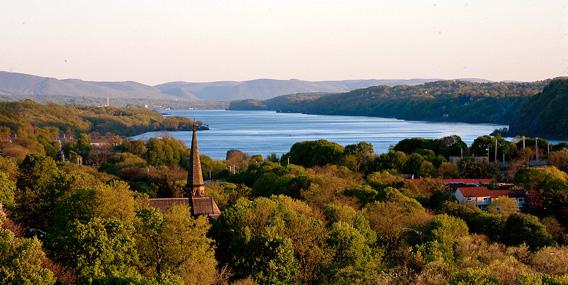I’m from a town called Poughkeepsie. That’s Po-KIP-see, if you please; rhymes with tipsy and gypsy. Forgive me if I sound a bit defensive. Poughkeepsie, N.Y., you see, has a reputation for being a particularly awful little place.
It wasn’t always so. Poughkeepsie was once a busy port on the Hudson River, and its residents made a good living shipping beer and factory goods downstream to Manhattan. But that was well over a century ago. When river shipping went out of style, so did Poughkeepsie, and its core decayed. Despite periodic attempts at revitalization—a pedestrian mall, a waterfront makeover, outdoor murals—the town settled into a stubborn slump, its center marked with empty-eyed brick buildings and quiet streets.
Poughkeepsie became a kind of inverse suburb, a place with all the disadvantages of both the city and the country. Crime was high, and there was nothing to do. Gene Hackman made the town a punch line with his “Pickin’ your feet in Poughkeepsie” rant in The French Connection, and it was still a joke years later when Ally McBeal lawyer John Cage stopped his bouts of stuttering by yelling “Poughkeepsie!” In the movie Sex and the City, Charlotte was reported to have “Poughkeepsie’d in her pants.”
Maybe you can see why we natives feel a little defensive.
Defensive or no, a lot of us quietly agree with the consensus. I know that as a teenager, I did: I thought Poughkeepsie was boring and ugly, with its gray skies, low hills, and flat, gray river. I left as soon as I could, heading to college in Oregon and then settling in the Southwest, where I fell for the sunshine and the topography. I returned to Poughkeepsie to visit friends and family, but never seriously considered a longer stay. As a fellow exile once told me, “It’s not hard to do better than Poughkeepsie.”
A few years ago, though, I interviewed the author and social critic James Kunstler about his novel World Made by Hand, his latest portrayal of a post-peak-oil future. Kunstler, famously crotchety, had plenty of pithy complaints about suburbs, Cheez Doodles, Walmart, and the American road trip. But when I mentioned my hometown, his mood shifted. “Oh!” he said, with what sounded almost like pleasant surprise.
I laughed, assuming sarcasm, but Kunstler was perfectly serious. In a hotter, drier, less climatically stable future, he said, medium-size towns like Poughkeepsie will be just right. “We’ll see people moving to places that are scaled appropriately to our energy diet,” he said—communities small enough to walk across, but big enough to pool their resources for needed infrastructure. Poughkeepsie is also close to good farmland and freshwater, he pointed out, and the Hudson might be useful for carbon-free transport too. “Towns like Poughkeepsie are at their nadir now,” he conceded, “but they have a lot of virtues that are going to become apparent in the years ahead.”
Virtues? This was new. Kunstler was hinting that I should pack up and head home? In all my years of reporting on the many effects of climate change, I’d never foreseen a one-way ticket to my iconically undesirable native sod.
I had to admit, though, that Kunstler had a point. My current home on the edge of the Colorado Plateau is comfortably distant from the interstate, and beautiful in a stark, desert-like way. But as the climate changes, so might my notions of livability, even beauty. Peace and quiet is appealing when one has enough fuel to escape it; the desert is beautiful when one has plenty to drink.
Late last summer, I spent a few days visiting family in Poughkeepsie. It was humid and almost blindingly green, the trees hanging low over sidewalks. Main Street looked a little livelier, with a row of Mexican grocery stores on one block and an upscale bistro on the next. The abandoned railroad bridge across the Hudson, a skeletal silhouette all through my childhood, had recently been repaired and reopened as a footpath, and it was crowded with locals enjoying its dramatic river vantage.
I took my 4-year-old daughter to the edge of Wappinger Creek, which flows into the Hudson just south of Poughkeepsie. She waded happily into the shallow water, flinging sticks into the current.
She was beautiful. Poughkeepsie wasn’t. But for the first time, I imagined that it might be.
This article originally appeared in the Summer 2013 issue of OnEarth magazine.
